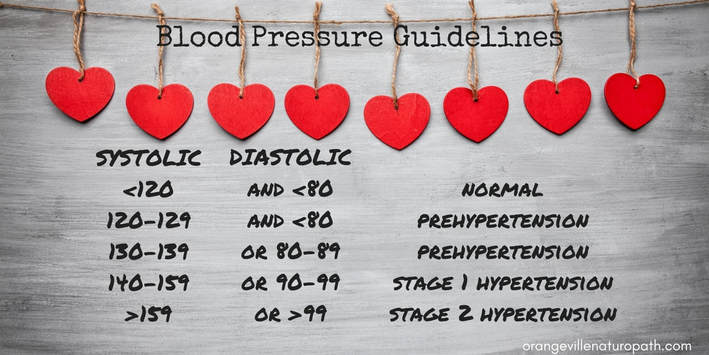
If you go for regular physical exams, you have no doubt had your blood pressure checked at one point or another. For most the results are "normal" but actual numbers are not discussed, or if they are the word "normal" has deemed the values irrelevant. The trouble with this is that it can be surprising to learn that you now have high blood pressure, as though it's come out of nowhere when the reality for many people is that the numbers had been climbing for some time until they eventually crossed a threshold. In medicine, it is the trends of the individual that are more important than the exact number. The same holds true for other health markers like blood sugar and other tests. That being said, I am delighted to see that the American Heart Association and the American College of Cardiology have changed their guidelines for evaluating blood pressure.
The Blood Pressure Story
As you can see under the new guidelines, any blood pressure reading over 120/80mmHg is considered prehypertensive (early stages of high blood pressure). This is different from before, when there was a grey zone where blood pressure is slightly elevated, maybe 5 points, but we would still call the value "normal". Not anymore.
This modification is significant because the prehypertensive window is the ideal time to make important lifestyle changes that lower your heart disease risk. Diet and exercise can have profound effects on managing blood pressure; however, it is much easier to prevent elevated blood pressure than it is to lower it without the use of medications.
Blood pressure is the force of blood against your vessels. No matter the cause (stress, inactivity, alcohol, smoking, poor diet, extra weight, diabetes, sleep apnea), elevated blood pressure means an increased risk of stroke, heart attack, dementia, kidney problems, retinopathy (eye problems), and erectile dysfunction. Checking your blood pressure regularly gives you the opportunity to make key changes to your lifestyle before there's a problem.
What About Low Blood Pressure?
To be honest, in my practice I actually see low pressure more frequently than high blood pressure. Hypotension (less than 90/60mmHg) can be totally benign, but can also come with symptoms like lightheadedness and dizziness or even fainting. Many of my patients experience dizziness from standing up quickly which is called orthostatic hypotension. It is caused by a failure of the nervous system to quickly adapt to a change in posture, and I often relate this to adrenal or thyroid hormone dysfunction. (I'll discuss this further in another post).
I'm Prehypertensive, What Can I Do?
Knowing that your blood pressure is trending upwards is a great opportunity to become aware of how your lifestyle can best serve you. High blood pressure is a risk factor, but you can reduce your risk of a number of diseases using the following ideas.
- 30 minutes of activity each day (walking, strength training, or any movement more than what you are currently doing)
- lose inches off your waist (ideal for women <35 inches, men <40) or lose 10lbs
- this also reduces the risk of sleep apnea - DASH diet or Mediterranean diet have great research for managing blood pressure, but really any whole foods (low processed food) dietcan be effective
- boost potassium with fruits and vegetables
- lower sodium by avoiding packaged foods
- consume a plant-based diet with many dark colours
- 3 stalks of celery and 1/2 cup pomegranate juice can lower blood pressure 5mmHg when consumed daily - stress management
- deep breathing, yoga, meditation (there are great Apps for this), practicing gratitude, journaling, self-care - limit alcohol, caffeine and smoking
- replace nutrients
- Magnesium relaxes blood vessels and reduces stress
- Omega 3 fatty acids (eg. fish oil) lower blood pressure but also make blood thinner to reduce risk of heart disease
- CoEnzyme Q10 is an energy source for the heart - use herbs to address your unique biochemistry
- herbs for stress or herbs that have a direct action on the heart can be used, particularly as an option to treat stage 1 hypertension successfully
Dr. Christa
 RSS Feed
RSS Feed